August 19th, 2017 — 10:55am
Category: FG - Fiction General
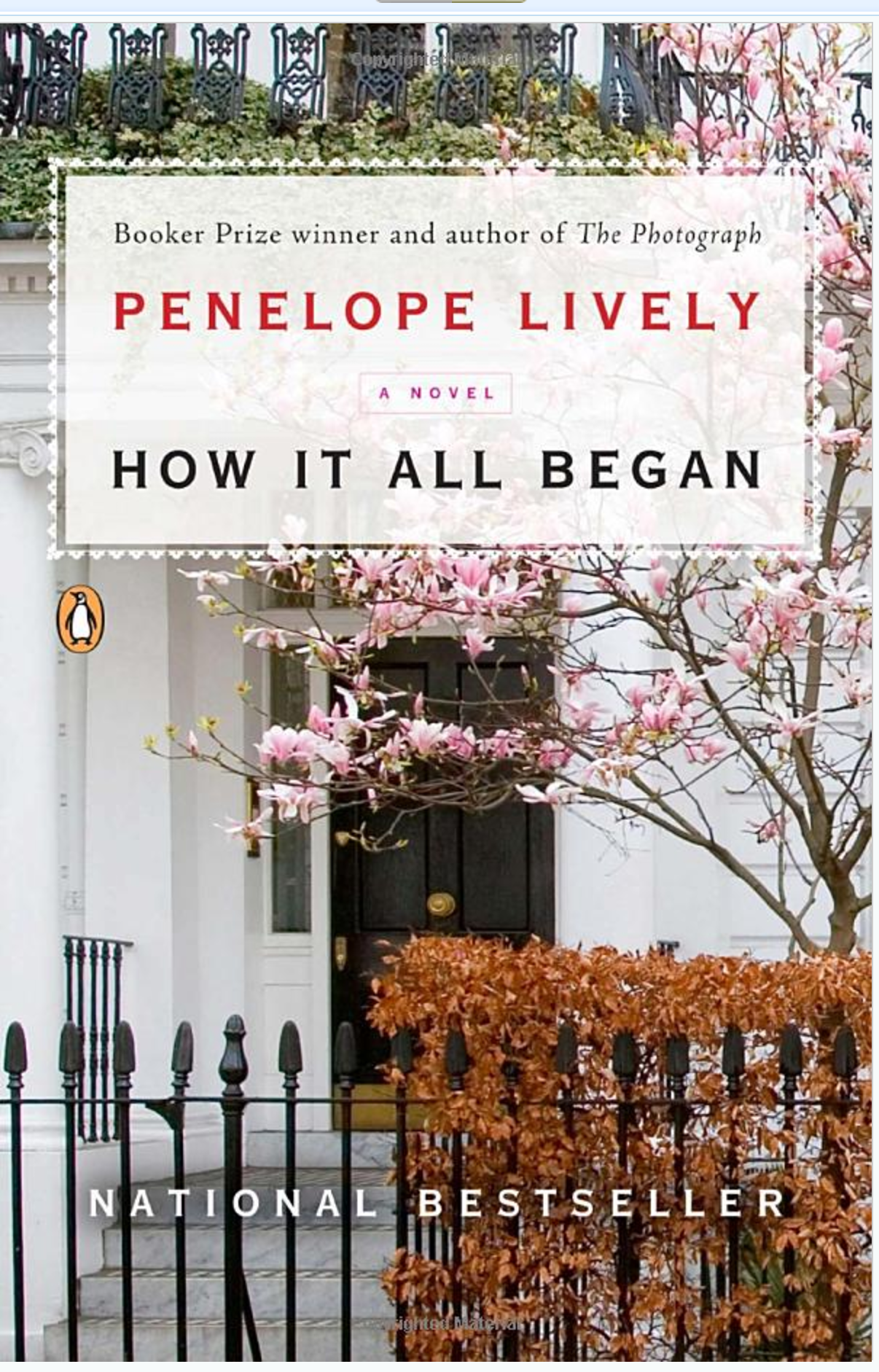
How It All Began by Penelope Lively
I must confess that circumstances led me to read this book over a more prolonged period of time than usual. I believe my appreciation for the story suffered because of this. The premise of this book is that events that occur in one person’s life will influence and even change the course of the life of another person which will impact and change the course of still another individual and so on and so on. The seminal event from the author’s point of view in this story was the mugging of an elderly woman which caused her to have a broken hip which led her to move in with her daughter and son-in-law which caused her daughter to take off from work and then brought about changes in the trajectory of other people. Needless to say there were events which led the woman and her mugger to cross paths which were not explained in this book
As I mentioned earlier, I didn’t quite get with the flow of the story but I did appreciate the engaging style of writing of Ms. Lively. The story of each person might very well have been developed into an interesting novel itself. However, from my point of view, the overall experience of this novel was not a satisfying one.
To purchase a copy of this book on Amazon, please click here.
You are encouraged to leave a comment -
Comment »
July 13th, 2017 — 9:44pm
Category: HI - History, P - Political, Social
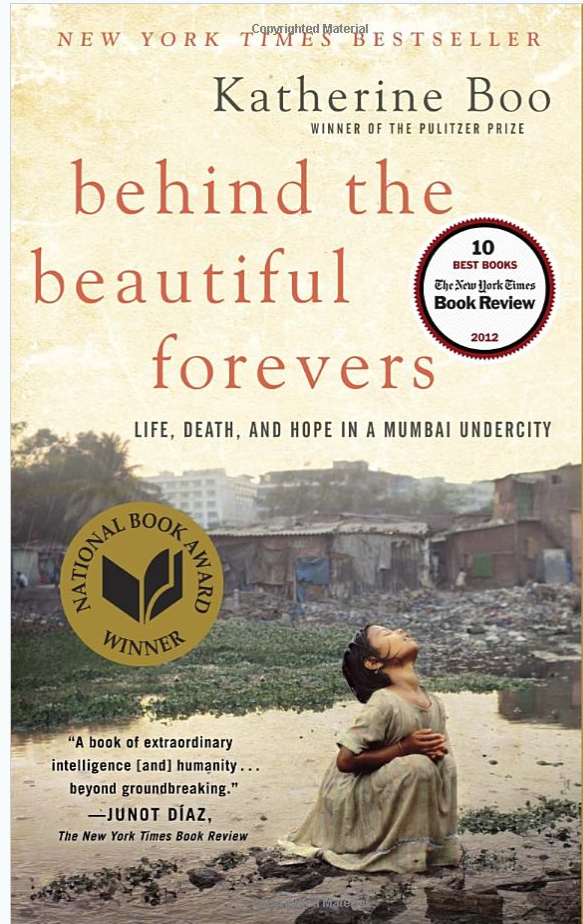 Behind the Beautiful Forevers by Katherine Boo
Behind the Beautiful Forevers by Katherine Boo
Much to my chagrin, I thought that I was reading a fiction novel until I concluded the book and read some notes by the author. It was then that I understood that the book is a true account of specific real people living in Annawanda, a slum on the outskirts of Mumbai (formerly known as Bombay) India. The author kept detailed notes about her interviews and discussion with the people described in this book. Everything in the book is purported to be true!
I come away from this experience with insight into the life of living in a slum in India. It is most depressing to realize the demeaning life that so many people are living there. It is especially disheartening to appreciate how so many children are deprived of an education and instead have to accept their role of hard labor at a young age. If something can even be worse than this, it is the type of work that these youngsters must pursue. Of course any type of child labor is deplorable but for the children of Annawanda and other such areas, a major work endeavor is scavenging garbage on a daily basis in order to come up with anything of value which might include used paper cups, uneaten food, scraps of metal and whatever. At times these children would seem to be from age 10 upward. They would find their lives endangered from security guards or dealing with risky physical hazards. Other times we learn how such children suffer the health consequences by incurring diseases and infected skin lesions by their daily submersion in garbage. The fact that their parents and other elders tolerate these activities by their children, have encouraged it as well or even joined them in some aspect of this work, only demonstrates the degenerate nature of their life.
It is ironic that these things are happening in a democratic country, which appears to have free elections. However, this book gives us a close look at the level of corruption among politicians at all levels, police and seemingly among just about any person who has any authority or advantage over another person. Paying bribes is an acceptable way of life even if these payments may be diminishing the food from their families.
Certainly this book is well written. The subject matter is riveting, if for no other reason that it is unbelievable. Does a woman with one leg being set on fire by herself or perhaps assisted by someone close to her, provide a dramatic scenario? Imagine a prolonged trial for this incident in which one of the defendants is a child being tried in juvenile court, all fraught with corruption and bribery.
Katherine Boo is a first time author who worked as a writer for New Yorker Magazine for many years and has spent a great deal of time reporting from poor countries. She is the recipient of a MacArthur Foundation “Genius” Award. It must have been an emotionally painful experience to have been so close to the depravity and misery that she reported in this story.
To purchase a copy of this book on Amazon, please click here
You are encouraged to leave a comment -
Comment »
June 29th, 2017 — 11:44pm
Category: FG - Fiction General
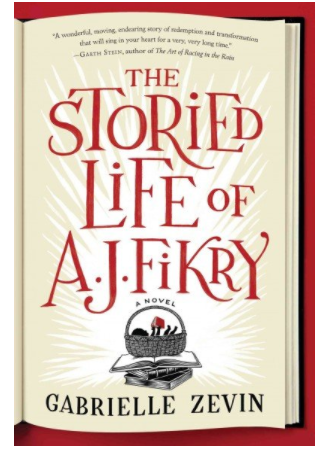 The Storied Life of A.J. Fikry by Gabrielle Zevin
The Storied Life of A.J. Fikry by Gabrielle Zevin
This book as the title suggests is about books and people who love them and love each other.
The story takes place mostly on Alice Island, a small island off the coast of New England. In reality there is no such place but it reminds me of Martha’s Vineyard or Nantucket. On this island there is a book store owned and run by a middle-aged man A.J. Fikry who had suffered the premature death of his wife. He also has had the unusual experience of having a woman who he did not know, leave her two year old in his bookstore before she ended her own life by walking into the ocean. Unexpectedly, he decided to adopt this infant and raise her. There is one more event necessary to set the scene for this novel and that is the appearance of Amelia, the new representative from a publishing company whose job would be to periodically a few times a year take the ferry to Alice Island where she would interact with the owner of the bookstore about new book releases. There is chemistry between A.J. and Amelia but there doesn’t seem to be an easy way for them to blend their lives.
There are other important characters in this book including Ismay, the sister of A.J.’s departed wife and Lambiase, a local police officer who falls under the spell of books and this bookstore.
There is an important concept in psychiatry called psychic determinism, meaning that all things are determined by events that occurred in the past. Our lives are altered by our interactions with various people, places and events. There are obviously an infinite number of examples how the existence of one element might change many lives. In this case we come to appreciate how this one bookstore and many of the people who came through its doors were altered and determined.
While I did enjoy this novel I also felt that I missed a good deal of appreciating the depth of it because there were many references to books that I have not read. In fact, each chapter started off with a reference to a classic story, which I am sure added to the enjoyment by those who read and remembered that book.
Finally, this novel also provided a reminder of how modern technology may be changing the bookstores of the world forever. At one point in the novel, A.J.’s mother appeared with gifts for adults and the child which consisted of E-readers. A.J. understandably didn’t like the idea of such a gift. We read this novel on an E-reader and we are little sad to say that we don’t know if we will find a reason to set foot in a bookstore again. Unlike the situation in this novel where book clubs were held in the bookstore, our own book club takes place in our members’ homes. This novel may very well end up belonging to the category of historical novels.
To purchase a copy of this book on Amazon, please click here
You are encouraged to leave a comment -
Comment »
June 20th, 2017 — 1:27pm
Category: FG - Fiction General, HI - History, P - Political
Septembers of Shiraz by Dalia Sofer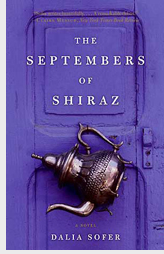
A successful, happily-married jeweler, father of two children, is in his store in Tehran, Iran, when he finds a man pointing a rifle at him and saying, “We’re here by orders of the Revolutionary Guard.” The year is 1979 and the Shah and monarchy of this country has been toppled.
As we get into this well-written historical novel, we find it very easy to identify with the members of this family, as well as with their hopes and aspirations. We can put ourselves in their shoes and relate to the father, Isaac, his wife, Farnaz, and their two children. It was only when their world was turned upside-down by Isaac being led away for interrogation and stay in prison of which his release was possible but so was execution, that we were entering into an unimaginable set of circumstances. The difference between his life and death while in captivity might be whether he would reveal information about “questionable” relatives or friends who may have supported the toppled shah or his government in any way. What would we have done?
From time to time we meet people who were born in Iran or their parents were born there, but we never imagined what they may have experienced. We probably know more about the Holocaust having spoken with or heard accounts by survivors in real life or from books and movies. There was one account in this book describing an Iranian man who had escaped to the United States and was a successful florist. It was revealed that the man had been a well-known university cardiologist in Iran before he was forced to leave in order to survive. Once in the United States, he couldn’t imagine going back to school and trying to get credentials and certifications to become a doctor again. So, he put his energy and creativity to becoming a successful florist. Once again, we think, what would we have done? Or perhaps the lingering question is could we have done what most of the characters in this book have done?
This book is apparently inspired by some actual experiences by the author as well as some understanding into what members of her family have gone through. The book is well-written. It serves not only as an insight of the history, but also as a solid description of family relationships and family psychodynamics. I highly recommend this it.
To obtain a copy of this book please click here
You are encouraged to leave a comment -
Comment »
April 5th, 2017 — 10:23pm
Category: E- Economic, HI - History, P - Political
Thank You for Being Late: An Optimist’s Guide to Thriving in the Age of Acceleration by Thomas L. Friedman 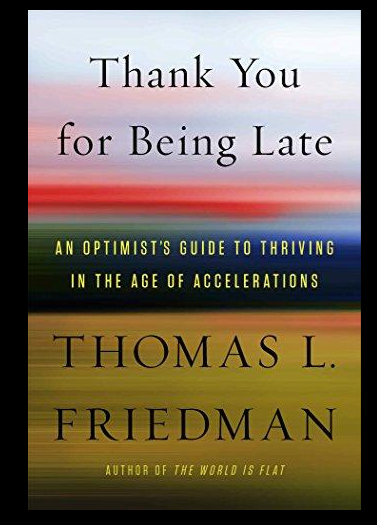
This by far is one of the most interesting, enlightening, and engrossing books that I have read in a long time and I have been reading some pretty good books.
Thomas Friedman has been a reporter, New York Times columnist and author who has been awarded Pulitzer Prize three times for his work. He has the uncanny ability to describe and provide insight into our modern society and where we are going from a historical, political, scientific, and humanistic viewpoint. He draws his experience and insight from his decades of reporting in the Middle East, Washington, DC, growing up in St. Louis Park, Minnesota, having met world renowned people in all walks of life including a parking lot attendant who he met who also writes a blog read in 30 different countries.
I know that the world in which my grandchildren are growing up is vastly different than my childhood experiences but Friedman with a simple explanation demonstrates how different it really is especially driven by technology. He cites “Moore’s Law” which is “the observation at the number of transistors in a dense integrated circuit doubles approximately every two years” (which reflects the accelerating scientific advancements in the world). Friedman then asks the reader to imagine the magnitude of change by visualizing a chessboard and putting the grain of sand on the one square and then doubling the amount of sand on each of the successive squares (64 in total on a chessboard). I googled the amount of sand that would be on the last box. It would be 18,446,744,073,709,551,600 grains of sand. It is this projection which illustrates how much scientific advancement is available to neutralize the statistics that show potential climate change, famine, unemployment, population growth, etc. etc.
Friedman wades into so many problems that our changing world is facing but emerges with an optimistic view that we can adapt as Mother Nature has been adapting since the birth of our planet (with the help of Moore’s Law). He concludes his book by turning inward and trying to understand himself and the community from where he came. He reviews his years growing up and reviews some recent visits to time visiting St. Louis Park, Minnesota which is a small suburban town where he attended public school and Hebrew school. He examines the values he extracted from his childhood experiences and also optimistically observes how this town is changing today with the new generation of immigrants but yet adapting and solving problems the way he hopes the rest of the country and the world will adapt. While he briefly mentioned his own parents and how they influenced him, I believe he underestimates the impact of the nuclear family and early childhood experiences.
Despite the above, this is not a simple homey book. Friedman deals with most subjects in great depth. He not only shares his own opinion but he cites statistics and conversations with wide variety of experts in every aspect of the subject matter. He reviews statistical trends, history, and in-depth discussions with many people. The hard copy version of this book is a solid 496 pages. You will come away from reading this book invigorated, knowledgeable and perhaps some of Friedman’s optimism will rub off on you.
To obtain a copy of this book, please click here
You are encouraged to leave a comment -
1 comment »
February 28th, 2017 — 4:49pm
Category: B - Biography
The Short and Tragic Life of Robert Peace by Jeff Hobbs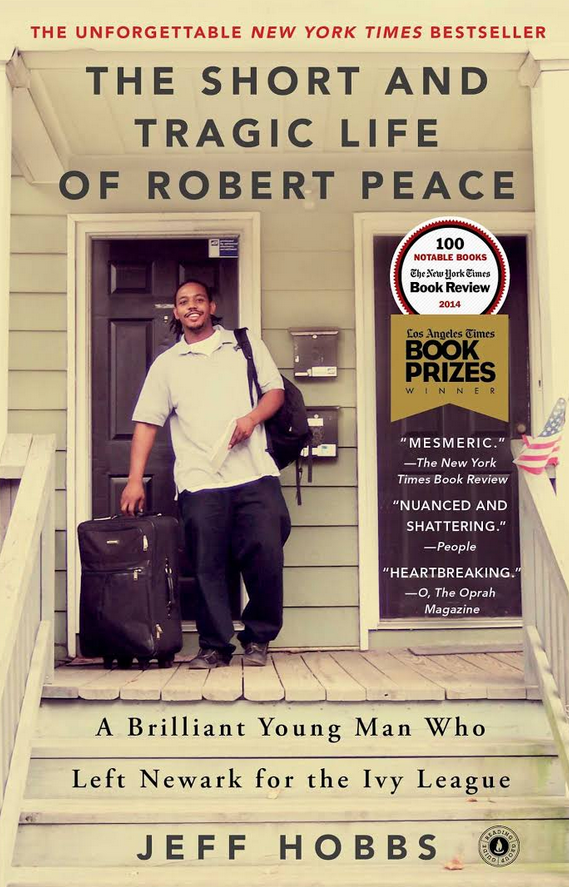
As is often the case, 30-year-old Jeff Hobbs had drifted apart from his college roommate when he learned that Robert Peace had tragically been killed. (No spoiler here as the title suggested it all). They had occasionally been in contact in the seven or eight years since they graduated from Yale. Hobbs was a budding writer with a novel under his belt. It must have been a combination of his knowing that his old roommate’s life was a story worth telling and his own grieving process that made him embark upon this project.
Once Hobbs decided to write a full book about Rob’s life, he spent about three and a half years talking to Rob’s family, especially Jackie, his mother, close friends, classmates and even some drug dealers. Hobbs basically reconstructed Rob’s life with a vivid description of events and circumstances including meaningful conversations that Rob had with various people in his life. The reader gets an insight into this young man’s intelligence and his feelings about other people. The story gives us a painting of how Rob grew up and how hard his mother worked to support him and motivate him. She worked numerous hours while also caring for her own sick mother. Rob’s close relationship with his father was very important to him. He visited his father in prison frequently for many years until his father died in prison while Rob was in college. Rob also worked even as a teenager, studying legal books to try to help his father appeal his conviction for murder for which he may have been wrongly convicted.
The reader understands Rob as a poor, very bright African-American young man who learned to navigate the streets of his New Jersey neighborhood Orange near Newark, as well as a Catholic High School and then Yale We appreciate how Rob handled the drug environment where he grew up and the mostly marijuana use that he saw at college and even became a trafficker in it. We viewed Rob at times as a scientist who studied molecular biology as a student and a researcher. We viewed him as an outstanding water polo player in high school and college and even after college, we see him struggling to find himself and plan for a possible future career at the same time that he was supporting himself by selling marijuana. He was a sensitive, empathic friend to many who was always ready to be very supportive in any way that he could.
The reader has to ask the question, did Rob’s life have to end the way that it did? It wasn’t just bad luck. There obviously were things that he could not overcome. Since this has become a popular book, it will be read by many young people including some poor bright kids like Rob, probably many African-American young men. Most will probably ask this same question, did his life have to end the way that it did? At one point while in college, he was called on the carpet by the school dean for selling marijuana. He could have been expelled but he was given a slap on the wrist and told not to do it again. We know that you can’t force people to enter therapy but I can’t help wondering if Rob had ever found his way into psychotherapy and had a meaningful relationship with a therapist, maybe he could have made the connections that might have derailed him from the bad decisions and indecision that occurred in the last year of his life.
This man obviously impacted many men and women as a teacher, coach and friend. In that way, he made a positive difference in people’s lives. This well-written book will also allow his life story to continue to influence others so the short life of Robert Peace won’t be so short after all.
To obtain this book from Amazon, please click here
You are encouraged to leave a comment -
Comment »
February 20th, 2017 — 2:56pm
Category: AM - Autobiography or Memoir, O - Other - Specify, P - Political
Just Mercy by Bryan Stevenson
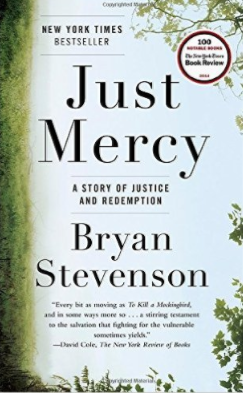 I must admit that when I started this book, I was not in favor of the death penalty, mainly because I felt there might be some isolated cases where someone might be executed when they were innocent and actually did not commit premeditated murder. Now after having read this eye-opening excellent book. I am strongly against the death penalty for many reasons. I have a much more enlightened view of the criminal justice system in the United States and the tremendous injustices brought about by mass incarceration particularly in the south, to blacks and also to children who are often tried and sentenced as if they were grown adults. I had no idea of the miscarriages of justice that occur in this country.
I must admit that when I started this book, I was not in favor of the death penalty, mainly because I felt there might be some isolated cases where someone might be executed when they were innocent and actually did not commit premeditated murder. Now after having read this eye-opening excellent book. I am strongly against the death penalty for many reasons. I have a much more enlightened view of the criminal justice system in the United States and the tremendous injustices brought about by mass incarceration particularly in the south, to blacks and also to children who are often tried and sentenced as if they were grown adults. I had no idea of the miscarriages of justice that occur in this country.
The person I have to thank for this new valuable insight is the author of this book, Bryan Stevenson. Through his writing, I learned how as a Harvard law student, he volunteered to assist a small group working in Alabama to appeal death sentences of of prisoners on death row. His interest in this work led him to devote his career to working in this area and ultimately founding the Equal Justice Institute in Alabama. He has won relief for dozens of condemned prisoners, argued five times before the Supreme Court and won national acclaim for his work challenging bias against the poor and people of color. He has received numerous awards, including the MacArthur Foundation “Genius” grant.
In this book, Stevenson allows the reader to understand in great detail how in many cases, clearly innocent people were railroaded through the criminal justice system to a guilty and death penalty sentence. Improper jury selection, failure of defense lawyers to bring in witnesses or important exculpatory evidence, prosecutors who hid important evidence from the defense and judges making improper rulings were just some of the factors which put innocent people on death row. There also were numerous examples of people being sentenced to death in prison (meaning a life sentence) often for non-homicidal crimes. There also was a description of the treatment of children to the same fate. Many of these teenage kids, sometimes 13 years old, were clearly innocent or were only peripherally involved in a non-homicidal crime but nevertheless were sentenced to death in prison via a life sentence. The predominance of these injustices occurred in southern states mainly to blacks which revealed this phenomenon as an extension of slavery in this country. Speaking of slavery, I could not believe the forced coercion that occurred in many prisons which was clearly cruel and unfair. Any failure of these prisoners to participate in such activities which might be picking cotton or operating sometimes dangerous machinery for long hours could lead to very uncomfortable solitary confinement as well as beatings and other violent attacks.
It is one thing to discuss all this issues with statistics and general statements which were then documented. In fact, seven and a half percent of this book was made up of documented lawyer-like references or citations to substantiate the terrible injustices described. However, it is even more effective when the author goes into great detail describing the history of real people whose lives are destroyed by unfair imprisonment and horrendous treatment. Mr. Stevenson’s personal interaction with many of these prisoners brings them to life in the pages of this book and makes a need to improve our justice system all the more imperative. It is also easy to empathize with his feelings not only for the innocent unfairly treated adults and children, but even those who were guilty of crimes and may deserve some punishment but also deserve our mercy.
To obtain a copy of this book on Amazon, please click here
You are encouraged to leave a comment -
2 comments »
February 12th, 2017 — 12:01am
Category: E- Economic
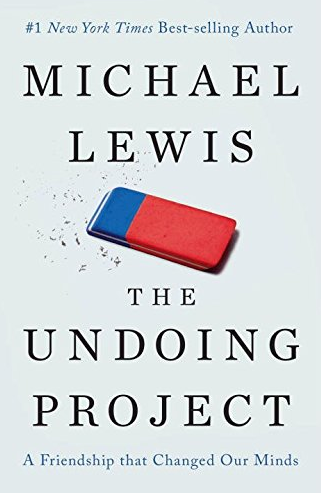 The Undoing Project: A Friendship That Changed Our Minds by Michael Lewis
The Undoing Project: A Friendship That Changed Our Minds by Michael Lewis
Michael Lewis is a popular writer who has written best-selling books on interesting economic issues. Two-and-a-half years ago in 2014, I reviewed Flash Boys where he provided a fascinating insight into the crafty manipulations of ultra-fast electronic trading. Another favorite book of mine was Moneyball (2003) where Lewis told the story of how computerized statistical analyses were changing how sport franchises were being run. He was also known for The Blind Side (2006), The Big Short (2010) and Liar’s Poker (1989), as well as several other books dealing with various aspects of Wall Street.
This time he takes on the story of two Israeli psychologists, Daniel Kahneman and Amos Tversky who through scientific evidence-based research provided unique insight into the human decision-making processes. They showed how human logic is often not very “logical”.
Prior to elaborating on their fascinating collaboration, Lewis traced each of their lives. Although they were both outstanding heroes in intellectual university circles and in the military service in the Israeli armed forces during wartime, they had contrasting personalities. This book provides a study of each of them. One was an extrovert and the other was an introvert who was a fugitive from the Nazis in his childhood. As their collaboration matured, they were a couple who could finish each others’ sentences and were never sure which of them had originated a particular idea. This was particularly interesting because when prizes including a Nobel Prize were being handed out later in their careers, one was much more favored than the other.
One of the fun parts of the book is that in some of their groundbreaking experiments in which they asked their subjects relatively simple questions about predicting “so-called random behavior,” the reader of this book is provided with some of these questions and asked to give his or her answer, and you can then you are shown the defects in your thinking.
The far-reaching implications of much of their work, is illustrated by the wide range of business and government agencies who sought their advice. One example was the airline industry who wanted help in preventing mistakes in logic made by airline captains during an emergency which led to fatal air crashes. Their solution was that you cannot prevent the mistakes in logic that the commander of a plane might make it an emergency situation, but you could change the cockpit culture where no one was allowed to disagree with the captain especially in an emergency.
I did feel that some of the dismissal of psychoanalytic theory by the brilliant duo did not appreciate that such theory was never meant to predict human behavior but rather to understand it in retrospect and therefore find a process to relieve psychological suffering.
Overall this book was as a worthwhile experience as were Lewis’ other books which I have read. It was quite enlightening and most enjoyable.
To obtain a copy of this book on Amazon, please click here
You are encouraged to leave a comment -
2 comments »
February 6th, 2017 — 3:29pm
Category: FG - Fiction General
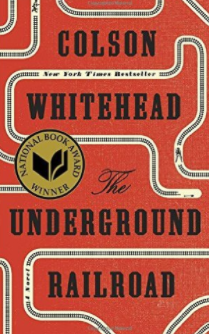 As any student of US history would know, there was not an actual “underground railroad” where slaves could ride a train and escape to the north or to the west where they could be free. Rather the term was used for men and women, black and white who risked their lives and developed an “underground” network where fleeing Blacks could be hidden and sheltered as they sought to be free of slavery and oppression that existed in this country.
As any student of US history would know, there was not an actual “underground railroad” where slaves could ride a train and escape to the north or to the west where they could be free. Rather the term was used for men and women, black and white who risked their lives and developed an “underground” network where fleeing Blacks could be hidden and sheltered as they sought to be free of slavery and oppression that existed in this country.
Colson Whitehead, the author of this book turns this metaphor into an actual train which would have the potential to ferry people to freedom. However, the very clear message of this book is that there was essentially no pathway to freedom in our country during this shameful period of US history. We see not only for slavery in the cotton fields and other areas of hard labor but also domestic slavery in the most “genteel” homes. We are reminded of the historical truth of the “breeding” of slaves, since children who grew into adult slaves had monetary value to their “owners.” There can be no denial of the brutal treatment of black slaves who were beaten and raped at will. The concept of so-called “ownership” of another person is explored at length in this book as we are introduced to the “slave catchers”. These are people who chase and trace slaves and bring them back to their “owners” for a large reward (often plus “expenses”). These bounty hunters have no border restrictions and were free to do their work in any part of the United States. As we were reminded of in the outstanding book and movie “12 Years a Slave” there were no safe zones in any part of the United States even in New York and in New England. Perhaps there were some so-called “black freemen” in some states but in additional to prejudice and discrimination which they faced, there was always the possibility of being kidnapped and sold into slavery.
As is often the case with a great novel, the author tells his or her story through the eyes of one or more characters. There were several people in the book who gave this reader the opportunity to understand their experiences. Most meaningful to me was to inhabit Cora, a young black girl who eventually “rode the railroad” and her mother Mabel, who abandoned Cora at a young age and made her attempted run for freedom.
Then there is the question of what would I do if I lived in that period and have the opportunity to hide a fleeing slave or perhaps a persecuted Jew in Nazi Germany, and in both cases knowing that if I were discovered it would mean death to me and my family. The author allows us to get some insight into such people who chose to be part of the “underground railroad”.
To obtain a copy of this book from Amazon, please click here
You are encouraged to leave a comment -
Comment »
December 16th, 2016 — 1:05am
Category: AM - Autobiography or Memoir
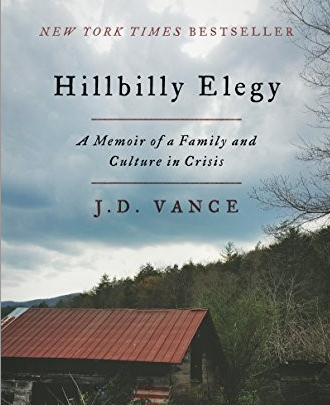 Hillbilly Elegy: A Memoir of a Family and a Culture in Crisis
Hillbilly Elegy: A Memoir of a Family and a Culture in Crisis
by J.D. Vance
This is a compassionate view of the white lower working class in which the author grew up. It provides an insight to the part of rural America which supported the incoming President of the United States, Donald Trump. The author proudly wears the name “hillbilly” and acknowledges that many parts of America look down upon that designation.
J.D. Vance grew up in Middletown, Ohio after his grandparents immigrated from Kentucky where coal mining jobs and other work were drying up and the mills and factories of the Mid-West seemed to offer opportunity for employment and some upward mobility. As we know, more recently there have been rough times for this area which became known as the “rust belt.” If you are not coming from a family of some means that is handed over to you, one must rely on the character traits that you have that will motivate you and allow you to navigate in this world. Family is very crucial here. J.D. Vance certainly did not have a role model from his parents. His mother, who showed flashes of caring for him did not provide emotional or any other type of support. She was a drug addict who ran through about five different husbands.
J.D. Vance’s saviors were his grandparents. His grandfather known as Papaw was probably an alcoholic who at least had a job but didn’t form any strong bond with the author. The most important person to him in his youth was his grandmother known as Mamaw – a very tough woman with whom he periodically lived and who gave him confidence in himself. He was obviously bright but came very close to dropping out of high school. Thanks to Mamaw, an occasional teacher and perhaps one or two other relatives he developed the “right stuff” not only to graduate high school but then had the where with all to join the United States Marine Corps where he served for four years. Having recently seen the movie “Fences” starring Denzel Washington and Viola Davis, we also appreciated another situation where joining the Marine Corps after high school, in this case a young black man was able to receive support and direction that he couldn’t get from his family.
J.D. Vance’s success in going through Ohio State University after the Marine Corps and working at various jobs to provide him money that he needed reflected his determination. He was then surprised at getting accepted at Yale Law School with very good financial support because he was probably the most needy student that was admitted that year. His observations of what it meant to be a student at Yale Law School were notable. He made the point that it was the connections and the networking which made all the difference in the world and opened so many doors for him.
Mr. Vance on one hand makes the point that self-will and determination are the necessary ingredients to succeed in the world but he also says that he wouldn’t have succeeded without the love and confidence in him provided by his grandparents. Without these factors he is sure he would not have made it out of Appalachia. This book informs us about the lives, trials and tribulations of people that many of us might never meet. It provides important insight and raises some very stimulating questions. It is a book well worth reading.
To obtain a copy of this book from Amazon, please click here
You are encouraged to leave a comment -
Comment »


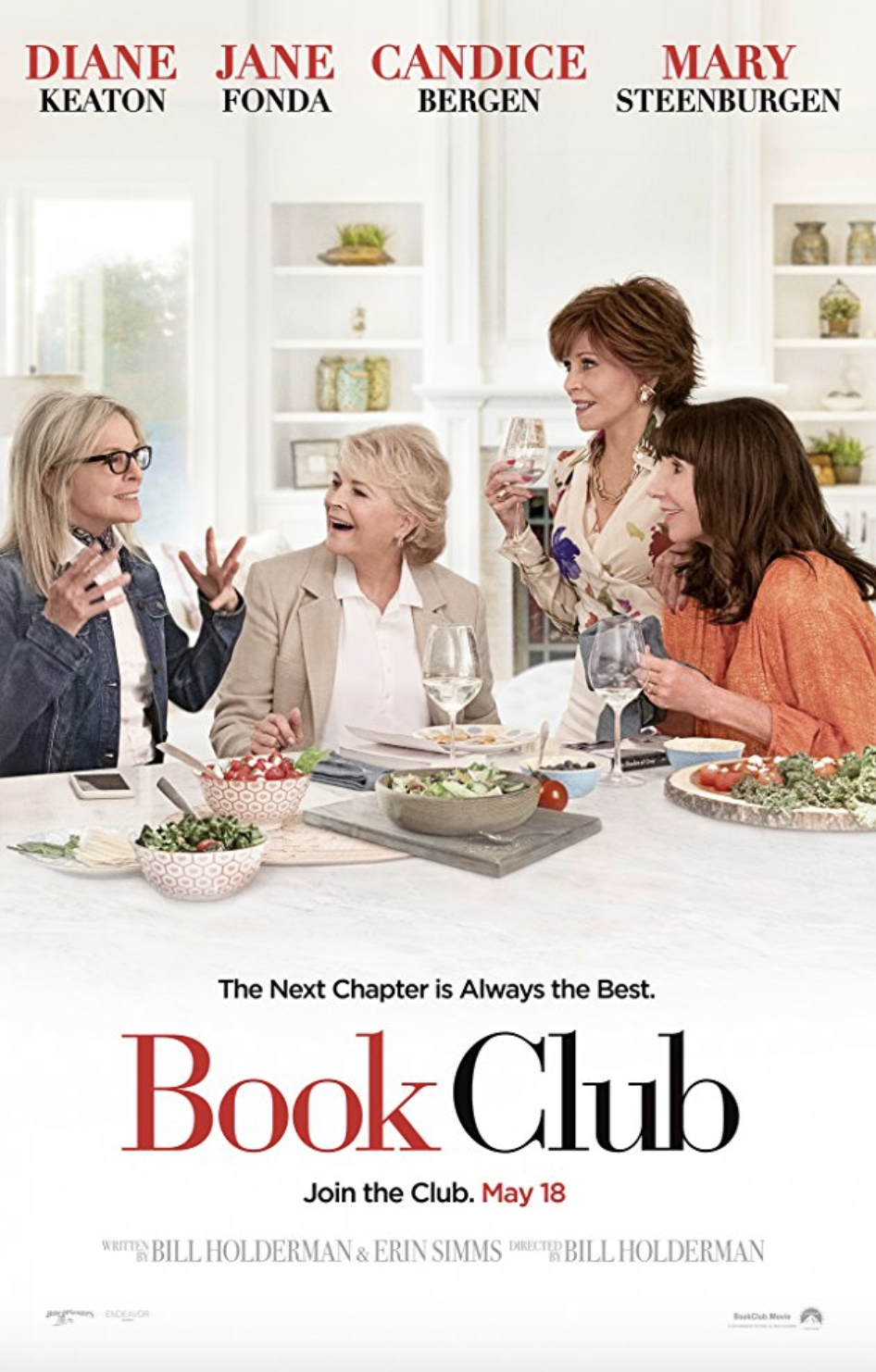

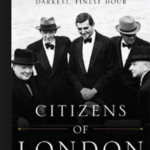
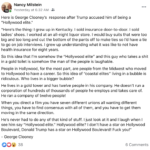
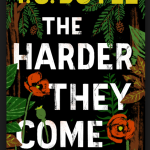

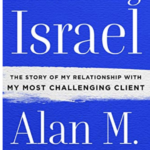
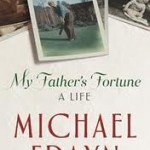
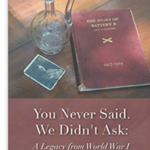

 Behind the Beautiful Forevers by Katherine Boo
Behind the Beautiful Forevers by Katherine Boo The Storied Life of A.J. Fikry by Gabrielle Zevin
The Storied Life of A.J. Fikry by Gabrielle Zevin


 I must admit that when I started this book, I was not in favor of the death penalty, mainly because I felt there might be some isolated cases where someone might be executed when they were innocent and actually did not commit premeditated murder. Now after having read this eye-opening excellent book. I am strongly against the death penalty for many reasons. I have a much more enlightened view of the criminal justice system in the United States and the tremendous injustices brought about by mass incarceration particularly in the south, to blacks and also to children who are often tried and sentenced as if they were grown adults. I had no idea of the miscarriages of justice that occur in this country.
I must admit that when I started this book, I was not in favor of the death penalty, mainly because I felt there might be some isolated cases where someone might be executed when they were innocent and actually did not commit premeditated murder. Now after having read this eye-opening excellent book. I am strongly against the death penalty for many reasons. I have a much more enlightened view of the criminal justice system in the United States and the tremendous injustices brought about by mass incarceration particularly in the south, to blacks and also to children who are often tried and sentenced as if they were grown adults. I had no idea of the miscarriages of justice that occur in this country. The Undoing Project: A Friendship That Changed Our Minds by Michael Lewis
The Undoing Project: A Friendship That Changed Our Minds by Michael Lewis As any student of US history would know, there was not an actual “underground railroad” where slaves could ride a train and escape to the north or to the west where they could be free. Rather the term was used for men and women, black and white who risked their lives and developed an “underground” network where fleeing Blacks could be hidden and sheltered as they sought to be free of slavery and oppression that existed in this country.
As any student of US history would know, there was not an actual “underground railroad” where slaves could ride a train and escape to the north or to the west where they could be free. Rather the term was used for men and women, black and white who risked their lives and developed an “underground” network where fleeing Blacks could be hidden and sheltered as they sought to be free of slavery and oppression that existed in this country. Hillbilly Elegy: A Memoir of a Family and a Culture in Crisis
Hillbilly Elegy: A Memoir of a Family and a Culture in Crisis 

